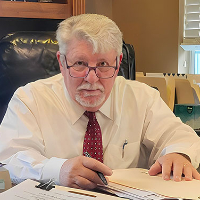Stanton Criminal Lawyer, Alabama
Christopher Rhett Smitherman
✓ VERIFIEDCriminal, Estate, Divorce & Family Law, Accident & Injury, Personal Injury
James Campbell Pino
✓ VERIFIEDFelony, Family Law, Personal Injury, DUI-DWI
With over 46 years of active trial experience, attorney Jim Pino has earned a solid reputation within the legal community for well-prepared and aggres... (more)
Anne Wilson Guthrie
✓ VERIFIEDBankruptcy, Family Law, Juvenile Law, Social Security, Divorce & Family Law
Anne Guthrie is a practicing lawyer in the state of Alabama. She received her J.D. from University of Alabama School of Law in 2000. Anne works at Wil... (more)
Albert Jones
✓ VERIFIEDAccident & Injury, Divorce & Family Law, Criminal, Estate
Albert Jones is a practicing lawyer in the state of Alabama.
FREE CONSULTATION
CONTACTRobert D. Segall
Mass Torts, Arbitration, Criminal, Bad Faith Insurance, Administrative Law
Status: In Good Standing
FREE CONSULTATION
CONTACT






